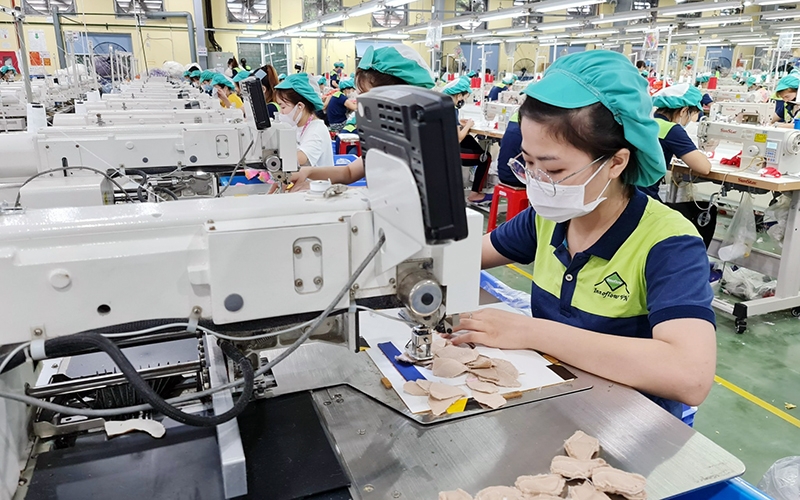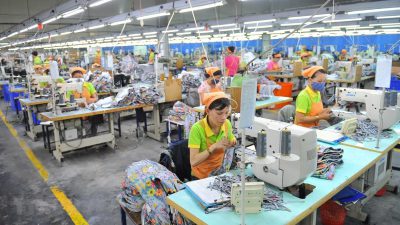
|
The number of workers in industrial zones in southern provinces of the Red River Delta who are positive for SARS-CoV-2 virus has increased sharply, reaching up to 10,000 cases per day in some places. This situation requires businesses to flexibly arrange and use labour in alignment with disease prevention and control to ensure efficient production amid worker shortages. |
|
According to the management board of economic zones and industrial zones in Thai Binh Province, more than 12,000 employees working for 63 enterprises in the province are currently infected with COVID-19. Many businesses have infections accounting for more than 60% of the total number of employees such as Minh Tri Company, Environ Company, Ha Hae Company, and others. Adaptation amid spike in F0 cases Manufacturing Sportwear Joint Stock Company’s Thai Binh branch has 10 factories with a total of 18,000 employees, of which more than 3,000 workers are taking turns to leave work because of COVID-19, leaving the company at risk of failing to complete orders as scheduled. To handle the labour shortage, the company has consulted state management agencies and workers to organise overtime work with payment for employees. Athena Shoe Company, in Yen Mo District, Ninh Binh Province, employs more than 7,000 employees, half of which are F0 and F1 cases. A representative of Athena Shoe Company said “There are production lines with only a few people working. In the short term, the company tries to maintain production and pay wages for workers during the temporary leave”. According to the Trade Union of Industrial Parks in Ninh Binh Province, industrial parks in the province had recorded nearly 4,600 F0 employees and more than 500 F1 employees who were on leave by the end of February. Meanwhile Nam Dinh Province recorded an average of 3,500 to 4,000 new cases of COVID-19 every day. The number of workers in industrial zones having to quit their jobs to quarantine and treat COVID-19 reached 10,000 people. Do Tuan Nam, the head of the administration department at Young One Co., Ltd. in Nam Dinh said: “The company has seen nearly 4,000 employees infected with COVID-19, greatly affecting productivity and causing an estimated loss of 1.5 million USD. Currently, the company is short by more than 200 workers. The company is expected to encourage asymptomatic F0 cases to continue working in a separate area and provide them with 1 million VND each. However, regulations on management and isolation of F0 must be adjusted more flexibly by functional agencies in order to create conditions for F0 workers who have had two vaccine shots and no symptoms to return to work.” The number of workers infected with COVID-19 in industrial zones in the southern part of the Red River Delta is still increasing day by day. But according to medical experts, most workers here have been vaccinated with two doses of COVID-19 vaccines, so they still feel secure to work without as much worry as before. Handling labour shortage Currently, about 82% of enterprises in industrial zones in Ha Nam Province are facing labour shortages. To solve the problem of labour shortages due to increasing number of F0 and F1 cases, businesses in Ha Nam Province have implemented many creative measures. Casablanca Vietnam Company, in Chau Son Industrial Park, Phu Ly City, Ha Nam Province, takes care regarding the quality of meals to improve the health of workers. The company also regularly organises COVID-19 testing for workers on the first and last days of the week to proactively control the pandemic. Director of Casablanca Vietnam Nguyen Viet Thao said: “The company boldly applies modern technological solutions in improving labour productivity and accelerating production progress to timely deliver goods to partners.” The Management Board of Industrial Parks in Nam Dinh Province has also been coordinating with local authorities to hold dialogues with enterprises to remove difficulties in pandemic prevention and promptly support them in recruiting domestic workers and in handling entry procedures for foreign workers. Vice Chairman of the Nam Dinh Provincial People’s Committee Tran Le Doai said: “The province has directed relevant departments and agencies to promote information technology application on providing information on the labour market and regular organisation of online job fairs to connect workers with businesses. The province also continues to implement the State’s support policies for businesses and employees affected by the pandemic, thereby helping businesses quickly supplement labour sources and promote their production while contributing to boosting the province’s socio-economic development.” The provinces of Thai Binh, Nam Dinh, Ninh Binh and Ha Nam to the south of the Red River have a lot of industrial zones, thus the health sector of the above localities should strengthen disseminating information and giving guidance on the new regulations on the management and treatment of F0 workers to ensure safety for workers and limit interruptions in production. When there are new cases, enterprises must strictly implement the quarantine according to the scale of the pandemic at production facilities and create conditions for F0 and F1 workers to participate in working at the quarantined areas or at a separate working area, to solve the labour shortages. Source: Nhan Dan Online |

